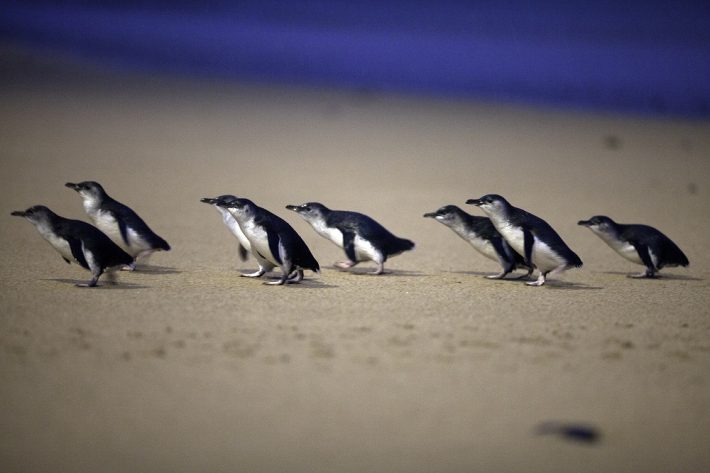Learning about penguin’s diet may save marine life, study finds
Monash University press release.
Researchers at Monash University and Phillip Island Nature Parks develop a novel index to determine the prey availability of little penguins which can help inform the sustainable future of their food supply. The findings are published in Functional Ecology.

The waters of south-eastern Australia are a climate change hotspot, warming at four times the global average. Understanding how to future proof the prey of little penguins in these challenging conditions is essential for their long-term survival and may well benefit the health of the whole marine system.
An Australian Research Council (ARC)-funded study led by Monash University and Phillip Island Nature Parks scientists and published today in Functional Ecology sets a new baseline for long-term monitoring of Bass Strait food webs.
Using the little penguins, an iconic predator, scientists developed a novel index to determine penguin prey availability from what penguins eat, how much and how hard they have to work hunting during their high-energy period of breeding.
The researchers found that the penguins extracted around 1300 tonnes of biomass from their coastal ecosystem over two breeding seasons, including 219 tonnes of the commercially important sardine and 215 tonnes of red cod.
“As marine environments are increasingly affected by human pressures and climate change, marine food webs are changing,” said study author Dr Catherine Cavallo, who completed her PhD at the Monash University School of Biological Sciences under the supervision of Associate Professor Richard Reina, and Phillip Island Nature Park marine scientist, Associate Professor André Chiaradia.
If little penguins can maintain breeding by switching prey to match availability, they may be more resilient to these changes than specialist predators
– she said.
“The study provides a single but robust index of prey availability to inform the sustainable future of penguin food supply, which will assist in their conservation and marine resource management’, said Assoc Prof Chiaradia.
“Penguins are significant predators in the sea around Phillip Island, analysing their diet is a good way of monitoring how marine life is affected by climate change, pollution and other environmental changes,” he said.
Associate Professor Reina adds ‘Our collaboration is discovering how adaptable these amazing birds are and how we can use this information to safeguard their future.’
The study follows research last year by the team, which found that little penguins had been eating jellyfish and salps – tiny tube-like animals not generally thought to be an important food source for penguins. This study had found that the jellies and salps made up about a quarter of the DNA found in the penguin faeces.
Whilst undertaking her PhD, Dr Cavallo’s research focussed on measuring and understanding how animals responded to changing environments.
You can read the article for free here:
, , , et al. Quantifying prey availability using the foraging plasticity of a marine predator, the little penguin. Funct Ecol. 2020; 00: 1– 14. https://doi.org/10.1111/1365-2435.13605
Media enquiries:
Silvia Dropulich
Marketing, Media & Communications Manager, Monash Science
T: +61 3 9902 4513 M: +61 435 138 743
Email: silvia.dropulich@monash.edu
Like what we stand for?
Support our mission and help develop the next generation of ecologists by donating to the British Ecological Society.